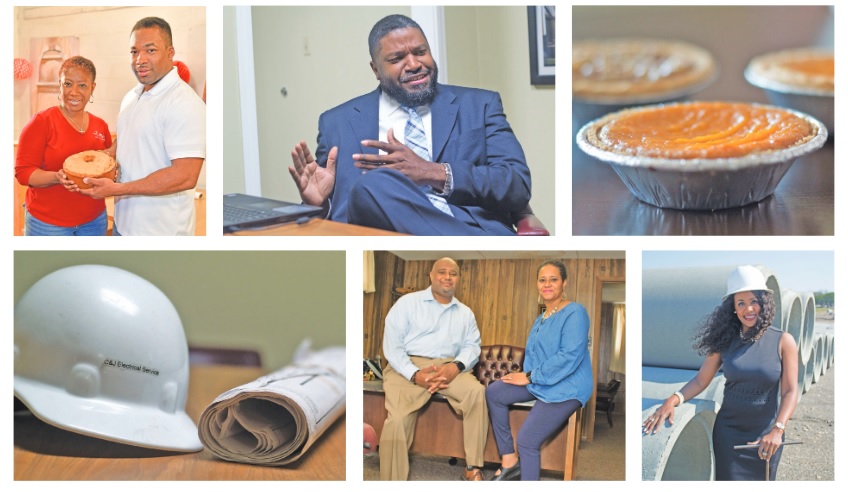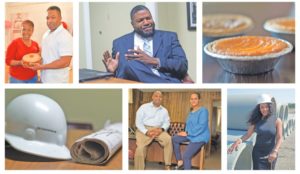
By Nathan Turner Jr.
For The Birmingham Times

Minority business owners in the Birmingham metro area say the key to success is a combination of patience, planning, perseverance, and prayer.
Curtis K. Richardson, president, CEO, and founder of Birmingham-based C&J Electrical Services LLC, said, “You have to be like water—it’s going to always find a way to go downstream. If you put a brick in the middle of a stream, [the water is] going to just go around. [Water] won’t let anything stop it from going where it’s trying to go.”
Richardson, who founded his company in 2001, has done work on the Birmingham Jefferson Convention Complex, the Hyatt Hotel on U.S. Highway 280, the Downtown YWCA, and the West End Walking Trail, among other projects. Currently, C&J has six full-time employees but can employ up to 22, depending on the number of projects.
Minority-owned businesses are a key part of the U.S. economy. In 2012, eight million of them contributed $1.38 trillion in revenue and 7.2 million jobs to the economy, according the U.S. Small Business Administration.
But that has not come without challenges, which include access to capital; competing for large-dollar contracts; and finding qualified employees and contractors, said Victor Brown, vice president of business development for the Birmingham Business Alliance (BBA).
“Overall, small businesses have not been comfortable with asking friends and family for money to seed their companies during the early stages,” he said. “Bootstrapping is admirable, but it doesn’t go far enough when a business is struggling with personal credit issues and/or a lack of business credit. It’s important for African-American-owned companies to be aware of interest on easy-to-obtain credit. Patience, planning, and perseverance are beneficial and wise for African-American-owned companies that look to achieve greater success.”
Over the past month, several local African-American business owners spoke to The Birmingham Times about the challenges they have faced while establishing successful enterprises.
Creativity
When Richardson opened his company in 2001, he refused business loans.
“You have to be creative in how you get your money,” he said. “I would ask businesses if they could pay up front, and some contracts had supplies provided. I would get less money on my end, but after a while I built up capital and was able to be stable.”
Richardson, who grew up in the Kingston community and studied electrical work at Lawson State Community College, struggled during his first three years in business.
“Businesses must define what they want to do and focus on building the business … and know that it’s not all peaches and cream,” he said.
Networking
Networking is important, and many minority group members fall short when it comes to networking, said Octavia Kuransky, a Birmingham-area business consultant whose expertise is in special training and preparation for small businesses and small-business owners.
“They may be good at what they do, but that’s not enough,” to compete in the business arena, she said. “They must cast a wide enough net and make a job out of learning to meet people.”
Kuransky explained that a relatively small percentage of business people wield a sizable chunk of influence across industries. And, she said, people do business with people they already know.
Richardson, who is also the president of the Birmingham Metro Black Chamber of Commerce, said new and established businesses should join associations and groups to link up with like-minded individuals.
Shella Sylla, 46, owner of SisterGolf, said she got to know clients in a nontraditional way. As a business banker in Florida, she noticed that male co-workers would regularly secure $750,000 in monthly sales. When she asked how to improve her own performance, a fellow employee urged her to start playing golf. Reluctantly, she joined the mostly white-male golf outings.
“I was the only African-American on the course, so I stood out,” said Sylla, who began her company in the Birmingham area in 2013. “People were curious about me and would come up to talk.”
In a short time, Sylla was registering bigger sales and became a member of her employer’s Million Dollar sales club, a designation given to associates who exceeded $1 million in production in any given month.
Confidence
L’Tryce Slade, 40, who founded her construction company, Slade LLC—Environmental Consulting, General Contracting, in 2006, said confidence is key for any business owner.
“I am often the only woman at the table, and I feel being a woman is an issue, more so than being black,” said Slade, whose 10-member firm conducted soil testing for the Birmingham Crossplex. “If I didn’t feel comfortable and believe I am just as equal to others, I would be unable to exude [my attitude] to others.”
Robert E. Joiner, president of Birmingham-based Joiner Fire Sprinkler Co., said he’s encountered stumbling blocks while building his business, but he has never felt hindered because of race because he is confident in the quality of his work.
“People want someone who can do a good job, and they don’t care if you are black or white,” he said. “I don’t get caught up in black and white. If someone does, that’s their problem.”
Faith
Faith is an important part of success for many small-business owners.
For JaWanda Jackson, owner, JaWanda’s Sweet Potato Pies, located in the Inverness Village Shopping Center in Hoover, running a business is equal parts faith, self-belief, and community service.
“It takes perseverance,” she said. “[You have to] believe in your product, believe in the goals you are setting out to accomplish, and believe that you’re going to make a difference. That’s the whole thing for me. … I believe life is about having an assignment, so I consider [my business] to be a ministry. Your job, your profession … when you take those things and use them for His glory, that’s a ministry. That’s what we’ve chosen to do with JaWanda’s Sweet Potato Pies.”
April and Lacy McClung Jr., owners of Emily’s Heirloom Pound Cakes in Hoover, said the company walks hand in hand with a higher power.
“The cake business doesn’t exist without faith,” said Lacy.
The company, headquartered in the Chef’s Workshop in Hoover, sells 500 pound cakes a week and owes its success to “faith, grace, and the anointing,” said April.
The aunt-and-niece duo of Cathy Cumbie and Danielle Baskin got the name for their company, Double Edge Events, from a Bible verse: Hebrews 4:12, which reads in part “For the word of God is alive and active. Sharper than any doubled-edged sword[.]”
“It’s a blessing to give the gift of beauty to our clients,” they said. “When we serve on that level, we can feel the love of God upon us.”
More stories in this series include interviews with the owners of Falls Janitorial Services and Marlon King, the chairman of the 2017 Birmingham Regional Enterprise Council (BREC).



